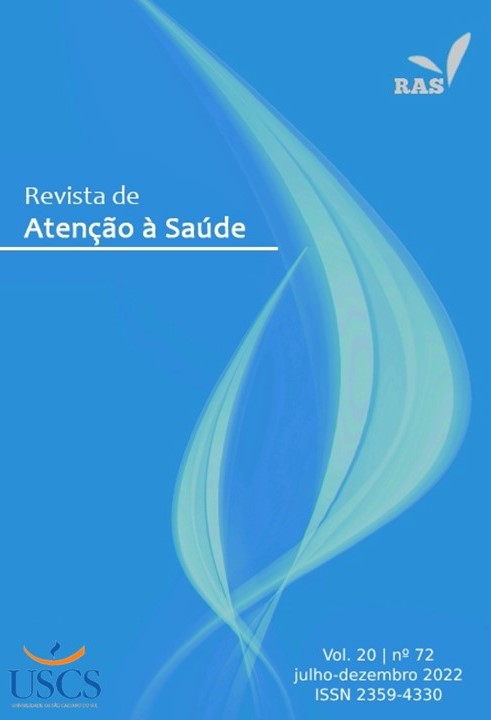FACTORS ASSOCIATED WITH THE RISK OF INFECTION AND HOSPITALIZATION BY SARS-COV-2 IN RHEUMATIC PATIENT
SARS-CoV-2 infection in rheumatic patients
DOI:
https://doi.org/10.13037/2359-4330.8335Keywords:
Covid-19. Doenças Reumáticas. Imunossupressão., Covid-19. Rheumatic Diseases. Immunosuppression.Abstract
INTRODUCTION: The severe acute respiratory syndrome-coronavirus 2 (SARS-CoV-2) presents clinical heterogeneity, depending on the singularities of the individuals. Rheumatic diseases, which course with immunological alterations, in addition to requiring immunomodulatory therapy for their control, end up influencing the responsiveness to SARS-CoV-2 infection. However, this association, as well as the risk and severity factors, have not been clearly elucidated. PURPOSE: to analyze the factors associated with infection and hospitalization of rheumatologic patients by SARS-Cov-2. MATERIALS AND METHODS: This is a narrative literature review, which used the PUBMED, Science Direct and the Regional Portal of the Virtual Health Library (VHL) databases, with the descriptors “Covid-19”, “Rheumatic Disease”and "Immunosuppression". 11 scientific productions were selected to compose this review. RESULTS: Rheumatic disease was not associated with increased susceptibility to infection/hospitalization by SARS-Cov-2. Regarding demographic factors, the association with increased risk of illness/hospitalization due to Covid-19 was not convergent. Comorbidities were identified as a factor of greater propensity for viral infection, as for anti-rheumatic drugs, there were divergences. CONCLUSIONS: Rheumatology patients had similar susceptibility to infection/hospitalization than the general population. Advanced age and the presence of comorbidities are factors associated with an increased risk of serious infection and hospitalization for Covid-19. As for immunosuppressive therapy, patients using Rituximab or glucocorticosteroids chronically have a higher rate of hospitalization and severe Covid-19 infection, with the former also increasing the risk of death. The use of anti-TNF alpha, on the other hand, has a protective effect.
Downloads
References
Pistone A, Tant L, Soyfoo MS. Clinical course of COVID-19 infection in inflammatory rheumatological patients: a monocentric belgian experience. Rheumatology Advances In Practice. 2020; 4(2): 1-8.
Scirè CA, Carrara G, Zanetti A, Landolfi G, Chighizola C, Alunno A, et al. COVID-19 in rheumatic diseases in Italy: first results from the Italian registry of the Italian Society for Rheumatology (CONTROL-19). Clinical And Experimental Rheumatology. 2020; 38(4): 748-753.
Thanou A, Sawalha AH. SARS-CoV-2 and Systemic Lupus Erythematosus. Current Rheumatology Reports. 28 jan. 2021; 23(2): 4-5.
Zhong J, Shen G, Yang H, Huang A, Chen X, Dong L, et al. COVID-19 in patients with rheumatic disease in Hubei province, China: a multicentre retrospective observational study. The Lancet Rheumatology. set. 2020; 2(9): 557-564.
Marques CDL, Kakehasi AM, Pinheiro MM, Mota LMH, Albuquerque CP, Silva CR, et al. High levels of immunosuppression are related to unfavourable outcomes in hospitalised patients with rheumatic diseases and COVID-19: first results of reumaCoV Brasil registry. Rmd Open. jan. 2021; 7(1): 1461-73.
Santos CS, Morales CM, Álvarez ED, Castro CÁ, Robles AL, Sandoval TP. Determinants of COVID-19 disease severity in patients with underlying rheumatic disease. Clinical Rheumatology. 27 jul. 2020; 39(9): 2789-96.
Del Papa N, Sambataro G, Minniti A, Maglione W, Pignataro F, Caminati A, et al. Impact of COVID-19 outbreak in an Italian cohort of patients with systemic sclerosis. Therapeutic Advances In Musculoskeletal Disease,. jan. 2020; 12: 1-8.
Strangfeld A, Schäfer M, Gianfrancesco MA, Lawson-Tovey S, Liew JW, Ljung L, et al. Factors associated with COVID-19-related death in people with rheumatic diseases: results from the covid-19 global rheumatology alliance physician-reported registry. Annals Of The Rheumatic Diseases. 27 jan. 2021: 1-13.
Taquette SR, Minayo MCDS, Rodrigues ADO. Percepção de pesquisadores médicos sobre metodologias qualitativas. Cadernos de Saúde Pública. 2015; 31(4): 722-32.
Sarzi-Puttini P, Marotto D, Caporali R, Montecucco CM, Favalli EG, Franceschini F, et al. Prevalence of COVID infections in a population of rheumatic patients from Lombardy and Marche treated with biological drugs or small molecules: a multicentre retrospective study. Journal Of Autoimmunity. jan. 2021; 116: 102545.
Fredi M, Cavazzana I, Moschetti L, Andreoli L, Franceschini F, Airò P, et al. COVID-19 in patients with rheumatic diseases in northern Italy: a single-centre observational and case–control study. The Lancet Rheumatology. 2020; 2(9): e549-e556.
Santos CS, Férnandez XC, Morales CM, Álvarez ED, Castro CÁ, Robles AL, et al. Biological agents for rheumatic diseases in the outbreak of COVID-19: friend or foe?. RMD open. 2021; 7(1): e001439.
Arleo T, Tong D, Shabto J, O’Keefe G, Khosroshahi A. Clinical course and outcomes of COVID-19 in rheumatic disease patients: a case cohort study with a diverse population. Clinical Rheumatology. 9 jan. 2021; 40(7): 2633-42.
D’Silva KM, Serling-Boyd N, Wallwork R, Hsu T, Fu X, Gravallese EM, et al. Clinical characteristics and outcomes of patients with coronavirus disease 2019 (COVID-19) and rheumatic disease: a comparative cohort study from a US ‘hot spot’. Annals Of The Rheumatic Diseases. 26 maio 2020; 79(9): 1156-62.
Quartuccio, L., Valent, F., Pasut, E., Tascini, C., & De Vita, S.. Prevalence of COVID-19 among patients with chronic inflammatory rheumatic diseases treated with biologic agents or small molecules: a population-based study in the first two months of covid-19 outbreak in italy. Joint Bone Spine. out. 2020; 87(5): 439-443.
Bachiller-Corral J, Boteanu A, Garcia-Villanueva MJ, de la Puente C, Revenga M, Diaz-Miguel MC, et al. Risk of severe coronavirus infection (COVID-19) in patients with inflammatory rheumatic diseases. The Journal of Rheumatology. jul. 2021; 48(7): 1098-1102.
Goldman JD, Robinson PC, Uldrick TS, Ljungman P. COVID-19 in immunocompromised populations: implications for prognosis and repurposing of immunotherapies. Journal for immunotherapy of cancer. 2021; 9(6).
Alzahrani ZA, Alghamdi KA, Almaqati AS. Clinical characteristics and outcome of COVID-19 in patients with rheumatic diseases. Rheumatology international. 2021; 41(6), 1097-1103.
Hasseli R, Mueller-Ladner U, Hoyer BF, Krause A, Lorenz HM, Pfeil A, et al.. Older age, comorbidity, glucocorticoid use and disease activity are risk factors for COVID-19 hospitalisation in patients with inflammatory rheumatic and musculoskeletal diseases. Rmd Open. 2021; 7(1), e001464.
Wang Q, Liu J, Shao R, Han X, Su C, Lu W. Risk and clinical outcomes of COVID-19 in patients with rheumatic diseases compared with the general population: a systematic review and meta-analysis. Rheumatology international. 9 mar. 2021: 1-11.
Montero F, Martínez-Barrio J, Serrano-Benavente B, González T, Rivera J, Collada JM, et al. Coronavirus disease 2019 (COVID-19) in autoimmune and inflammatory conditions: clinical characteristics of poor outcomes. Rheumatology international. 2020; 40(10): 1593-98.
Downloads
Published
Issue
Section
License
Copyright (c) 2023 Camila Fernandes, Yuri Quintans Araujo, Tiago de Sousa Viana, Marcos Vinicios Pitombeira Noronha

This work is licensed under a Creative Commons Attribution-NonCommercial-NoDerivatives 4.0 International License.
Policy Proposal for Journals offering Free Delayed Access
Authors who publish in this magazine agree to the following terms:
- Authors maintain the copyright and grant the journal the right to the first publication, with the work simultaneously licensed under a Creative Commons Attribution License after publication, allowing the sharing of the work with recognition of the authorship of the work and initial publication in this journal.
- Authors are authorized to assume additional contracts separately, for non-exclusive distribution of the version of the work published in this magazine (eg, publishing in institutional repository or as a book chapter), with the acknowledgment of the authorship and initial publication in this journal.
- Authors are allowed and encouraged to publish and distribute their work online (eg in institutional repositories or on their personal page) at any point before or during the editorial process, as this can generate productive changes, as well as increase impact and citation of the published work (See The Effect of Open Access).









